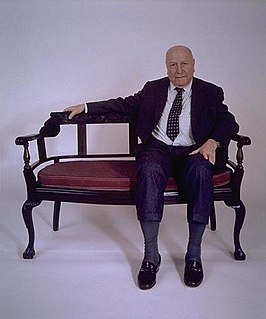A Quote by Mihaly Csikszentmihalyi
It is when we act freely, for the sake of the action itself rather than for ulterior motives, that we learn to become more than what we were.
Related Quotes
It is when we act freely, for the sake of the action itself rather than for ulterior motives, that we learn to become more than what we were. When we choose a goal and invest ourselves in it to the limits of concentration, whatever we do will be enjoyable. And once we have tasted this joy, we will redouble our efforts to taste it again. This is the way the self grows.
What we learn for the sake of knowing, we hold; what we learn for the sake of accomplishing some ulterior end, we forget as soon as that end has been gained. This, too, is automatic action in the constitution of the mind itself, and it is fortunate and merciful that it is so, for otherwise our minds would be soon only rubbish-rooms.
But I'd rather help than watch. I'd rather have a heart than a mind. I'd rather expose too much than too little. I'd rather say hello to strangers than be afraid of them. I would rather know all this about myself than have more money than I need. I'd rather have something to love than a way to impress you.
What a delight it is to think that you are quietly & philosophically at work in the pursuit of science... rather than fighting amongst the crowd of black passions & motives that seem now a days to urge men every where into action. What incredible scenes every where, what unworthy motives ruled for the moment, under high sounding phrases and at the last what disgusting revolutions.
None of us has ever seen a motive. Therefore, we don't know we can't do anything more than suspect what inspires the action of another. For this good and valid reason, we're told not to judge. Tragedy is that our attention centers on what people are not, rather than on what they are and who they might become.
Christian morality (so called) has all the characters of a reaction; it is, in great part, a protest against Paganism. Its ideal is negative rather than positive; passive rather than action; innocence rather than Nobleness; Abstinence from Evil, rather than energetic Pursuit of Good: in its precepts (as has been well said) "thou shalt not" predominates unduly over "thou shalt.
I'm so proud that now you can exist as a gay man and be an Olympian, and it can be beneficial rather than negative. So it's amazing. And I just think I feel so liberated now that I've been out of the closet for a while, and so I'm free in that I just get to be myself, speak freely, act freely, and I think that I am competing confidently.
Every one knows that the heavenly bodies move in certain paths in relation to each other with seeming consistency and regularity which we call [physical] law. ... No one attributes freewill or motive to the material world. Is the conduct of man or the other animals any more subject to whim or choice than the action of the planets? ... We know that man's every act is induced by motives that led or urged him here or there; that the sequence of cause and effect runs through the whole universe, and is nowhere more compelling than with man.
They would make the 'Church ' their great meeting-point, rather than the Atonement of Christ. As far as my experience goes, they have more devoutness and less devotion, more fear and less love, more feeling of duty than of desire, laying more stress on Phil. ii. 12 than ver. 13, and in practice working upon the intellect and imagination rather than aiming at the heart, skirmishing among the outworks rather than assaulting the citadel.
If it were true that conservatives were racist, sexist, homophobic, fascist, stupid, inflexible, angry, and self-righteous, shouldn't their arguments be easy to deconstruct? Someone who is making a point out of anger, ideology, inflexibility, or resentment would presumably construct a flimsy argument. So why can't the argument itself be dismembered rather than the speaker's personal style or hidden motives? Why the evasions?




































